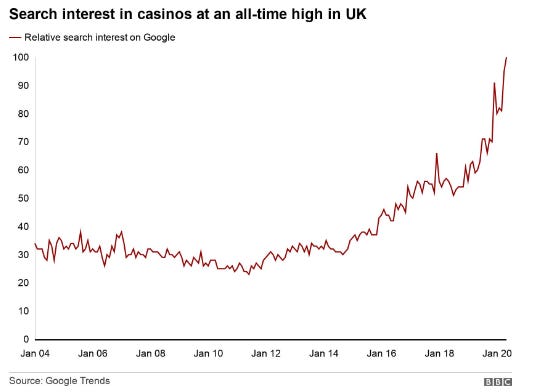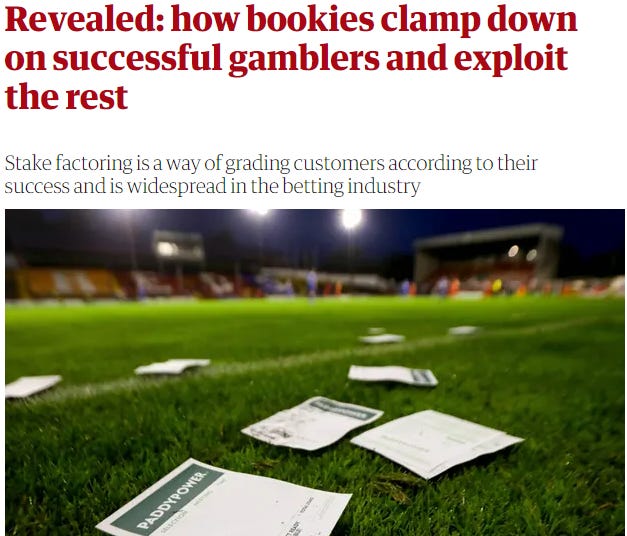Walking the tightrope between trading and gambling.
What professional gamblers can teach us about profiting in Crypto.
In a previous era of my life, I spent every hour of free time I had learning how to become a professional gambler.
I wasn't a flashy Rolex-wearing chad, stacking chips at the roulette wheel or a card-counting nerd in Vegas.
I was simply an inquisitive, anxious twenty something who despised my job and spent an embarrassingly large amount of time searching for ways to make money so I could escape the hellish rat race and lead a more fulfilling life.
It was as I ventured down these weird niche internet rabbit holes looking for a way out that I found two things:
Bitcoin
Matched Betting
Discovering Bitcoin is a topic for another day. Today's topic is gambling. (If you're only interested in the crypto aspect, feel free to skip to the end.)
In the 2010s, gambling in the UK exploded alongside rapid developments in online payment infrastructure and smartphone technology. As a result, in-person gambling establishments began to offer online solutions to attract a new generation of punters looking to make a quick buck.
To entice new users, bookmakers started running promotions, such as "Bet £100 with us, and we'll give you a £100 free bet," or "receive a refund if your horse finishes second."
(Image taken from https://www.savethestudent.org/make-money/what-is-matched-betting.html)
These promotions are loss-leading marketing tactics and they were profitable for several reasons:
they knew that most of the odds they offered were poor, and over time, users would almost always lose money
they knew that most users would continue to gamble with them after losing their initial deposit
they knew that some users would venture away from sports betting and into their online casino, where the odds were infinitely worse
they allegedly definitely didn’t calculate that some users would develop life ruining addictions and spend their entire life savings with them
However, despite the common consensus being that it was impossible to win as a gambler, those with a ton of self restraint and some basic maths could venture above the murky world of gambling, and enter the world of Matched Betting.
Matched Betting, put simply, is the method of covering all outcomes of an event to qualify for free bets and bonuses for a minimal loss. Once you are issued your free bet, you do this once more to make a predefined profit, regardless of the outcome of the event.
There are guides online detailing how you do this. I won’t cover it here as its a lengthy explanation that isn’t super interesting to most of you, but once you get your head round it it's a topic that sounds complex that’s actually remarkably easy.
At the start, matched betting was an insanely profitable venture. Bookmakers were fighting as hard as they could to win new customers by throwing out bigger and bigger offers to try to win the loyalty of the online gambling community.
For a long time, despite lots of information and guides out there on the internet, almost no one was taking advantage of this.
There were probably several reasons for this:
The narrative that all people betting must be stupid and no one can possibly beat the house stopped people from thinking critically about the topic
Humans have a hard time quantifying expected value and returns. A guaranteed, 100% confirmed £20 win with zero risk doesn't sound as exciting as a possible £1,000 return, even if the chances of winning that £1,000 are almost zero.
Even if you have the knowledge of how to do matched betting, casinos are smart, and they employ a ton of psychological strategies to encourage taking bets that are -EV. It is incredibly easy to start out as a matched bettor but end up losing money out of boredom or because you decided to stray outside of the predefined risk areas to simply gamble.
The early days of matched betting were a gold mine. I was actually very late to the scene, but in my first year of doing it, I earned as much as my full-time job and was able to fund my house deposit solely from gambling winnings (those £20 wins compound very quickly).
Over time, though, all great things must come to an end. As more and more people discovered this risk-free way of making money, the value began to erode.
Betting companies employed algorithms to sniff out those who were extracting value from them and quickly placed limits or banned anyone consistently making money.
After a few years of doing it, this happened to me, and I became "gubbed"* from basically every online sportsbook in the country, making it no longer worth my time.
*Gubbed is a term referring to someone who is essentially banned from a betting site for winning too frequently. Many people have ethical complaints about this process as it essentially solidifies a risk-free profit printing practice for bookmakers and prevents a fair market. But there's no point in crying over it; it's always better to trade what you see than what you want to see.
Why should you care about me larping as a professional gambler? How is this in any way relevant to making money in crypto?
Right now, the exact same thing is happening in crypto. The glory days are here!
Projects are essentially competing with each other for market and mindshare by paying users to use them, help improve them, or grow their TVL. This is either in the form of airdrops, loyalty bonuses, or free tokens.
This is the exact same thing the gambling industry did a decade ago, except the odds are obfuscated, and the "free bets/rewards are unknown."
What makes it so lucrative right now is that most users in crypto are completely ignoring it. Teams typically don't communicate their airdrops ahead of time, so many users don't consider this a strategy worth focusing on.
Instead, most users are opting to yolo their savings into 1000x moonshots rather than using strategic and mathematical thinking to place low-risk but extremely high-upside bets.
The average user is more interested in trying to replicate the success of the handful of Bored Ape owners who diamond-handed their monkey pictures to half a million and back again.
It's like someone has dropped a $100 bill in the centre of the room. Everyone rushes in and begins fighting each other for it, without realizing there are thousands of $1 bills dotted around the edges of the room. While everyone is in there fighting for the big win, you can wander roundly comfy, picking up the free money from the floor.
On the other end of the spectrum, you have the hordes of airdrop hunters that flood every Discord demanding wen token and spamming thousands of 0.0001 ETH transactions in the hope of earning some free money.
Neither of the above cases are likely to work.
So how do you find the free money?
Blindly farming airdrops is no longer likely to work.
Teams have wised up, and they know airdrop farmers are out there, and it's likely they will get better filtering them out and rewarding only those who have provided true value to the platform.
The secret to success here is finding the win-wins. Help only the good projects while learning and gaining something yourself. Sometimes those $1 bills at the fringes are actually worth far, far more.
Consider what projects are launching or have launched that are legitimately novel, useful, interesting, or innovative.
Make a shortlist of these projects. Join the Discords, read the Medium articles and documentation, and try out the platforms. Being early is certainly better than being late. Speak to the team, ask questions, and try to get a legitimate understanding of what the team is trying to build.
Use the products, test them out, and give honest and helpful feedback and recommendations to the team. This will help you quickly filter out which teams are genuinely good and which ones are not.
Once you have narrowed down your list, scrap any projects that you're not impressed by.
Focus your efforts on the handful of projects that are truly impressive and have the highest upside.
Look into the investors and their portfolio companies. Have they done airdrops before? What mechanisms did they use? How long did they wait to do it after the launch? Has the team offered any hints or are they explicit in their documentation? Can you read between the lines to determine what type of behaviour they are trying to incentivize? Have all of their main competitors launched tokens?
From here, you can determine your strategy using probabilistic thinking to optimize the use of your time and Eth. Your ultimate goal should be to spend your time in a way that, even in the worst-case scenario where no token ever arrives, you will have made a profit or at worst, a small loss.
Even if there is no monetary gain, you can still learn something from the process, understand cutting edge tech, meet people who may be able to help you in the future, or have a better understanding of that area of crypto that you can apply to future trades.
Example time!
Source: https://cointelegraph.com/news/early-ethereum-name-service-ens-adopters-rewarded-with-a-hefty-five-figure-airdrop
A great example of this approach is the ENS airdrop, which could have been forecasted without incurring any real risk.
ENS was a project with a real use case, actual users, a working product, and a good team, making it worth putting some focus into.
A great strategy would have been to register ENS names that would likely have some resale value, so even if ENS never airdropped a token, you could still possibly book a small profit, sell them for breakeven, or get out with a slight loss.
This small, low-risk bet would have rewarded you with over five figures in profits.
A live example is Gem V2, which has heavily hinted at a token and has a great product and dev team.
You can double this up with Blur season 2 by buying NFTs you believe to be undervalued on Gem and then listing them on Blur for listing points. (which are likely being largely ignored).
In the worst-case scenario where Gem never gives out a token, you will have earned Blur listing points, possibly made a profit with the NFT trades, and learned more about trading and marketplace dynamics. You will also have a greater understanding of how the marketplace wars are progressing, allowing you to better predict future winners.
In Summary:
Every single time I’ve used this process, it’s been risk adjusted, the most insanely profitable use of my time.
I think for most non already giga rich people, using this strategy is the most consistently profitable one. Time and time and time again we’ve seen people receive 10’s or 100’s of thousands of dollars simply for using Crypto applications.
Whilst this will likely get harder in future, it shows no signs of stopping just yet.
Maybe it's time to start thinking more like a matched bettor, and less like a gambler.








